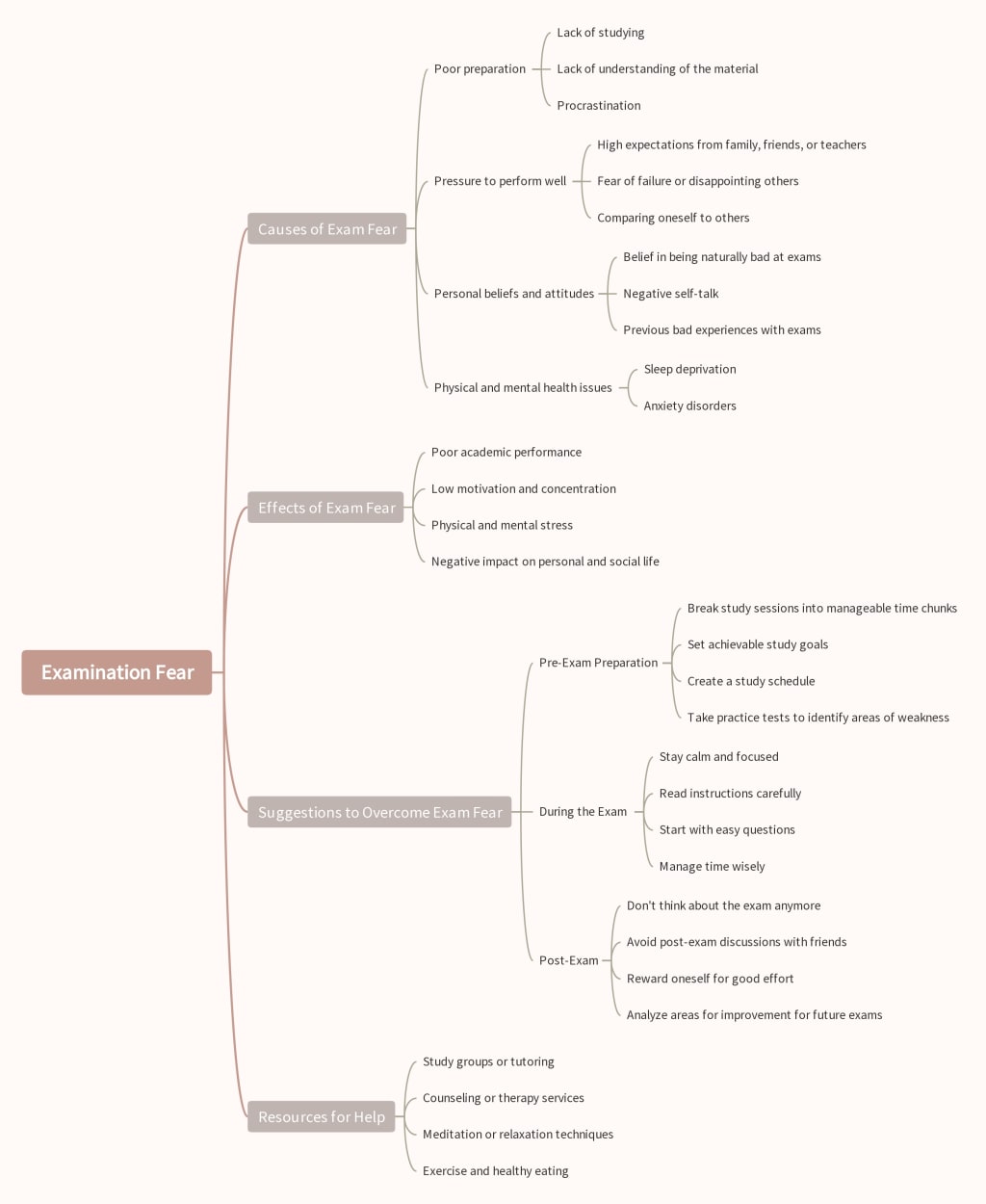Conquering Examination Fear
Understanding, Coping, and Succeeding

Introduction:
Examinations are a significant part of academic life, serving as a measure of knowledge, understanding, and performance. However, for many students, the anticipation and pressure surrounding exams can lead to a phenomenon known as examination fear or test anxiety. This anxiety can manifest in various ways, such as a racing heart, sweaty palms, or even a mental block during exams. It can hinder students' ability to perform at their best and adversely affect their overall well-being.
In this article, we will delve into the causes and effects of examination fear, explore how it can impact students' academic journey, and offer practical suggestions and resources to help overcome this common challenge. By understanding the underlying factors that contribute to examination fear and discovering effective coping mechanisms, students can develop the resilience and strategies necessary to navigate exams with confidence and achieve their full potential.
Examination fear is not just a fleeting nervousness; it can have long-lasting consequences on students' academic performance and self-confidence. Therefore, it is crucial to address this issue and equip students with the tools they need to conquer their fears. By implementing proven techniques, seeking support from resources and professionals, and cultivating a positive mindset, students can transform their relationship with exams and unlock their true potential.
Join us as we explore the intricacies of examination fear, uncover practical tips and strategies for success, and discover valuable resources that can empower students to conquer their fears, embrace the challenge of exams, and thrive academically. Together, let's embark on a journey towards overcoming examination fear and unlocking the path to success.
Causes of Examination Fear
Examination fear can arise from various underlying factors, and understanding these causes can shed light on why students experience anxiety and apprehension when facing exams. Here are some of the common causes:
1. Fear of Failure and High Expectations:
The fear of failure is a significant driver of examination fear. Students may place immense pressure on themselves to perform exceptionally well, driven by high expectations from themselves, their parents, or society. The fear of not meeting these expectations can create a sense of anxiety and self-doubt, intensifying examination fear.
2. Lack of Preparation or Time Management Skills:
Insufficient preparation or inadequate time management skills can contribute to examination fear. Students who feel unprepared for exams may worry about not having covered the necessary materials, leading to a lack of confidence in their knowledge and abilities. Poor time management can also add stress and make it challenging to effectively allocate study time.
3. Performance Anxiety and Self-Doubt:
Performance anxiety is another common cause of examination fear. The fear of underperforming or not meeting personal standards can lead to a constant worry about making mistakes or forgetting important information during exams. Self-doubt can further exacerbate this anxiety, making it difficult for students to trust their abilities and perform at their best.

4. Negative Past Experiences or Academic Pressure:
Negative past experiences, such as receiving poor grades or struggling in previous exams, can contribute to examination fear. These experiences may create a fear of repeating past failures or encountering similar difficulties. Additionally, academic pressure from parents, teachers, or peers can amplify examination fear as students feel the weight of expectations and worry about disappointing others.

5. Perfectionism and the Desire for Approval:
Perfectionism, the constant pursuit of flawlessness and high standards, can significantly contribute to examination fear. Students who place excessive emphasis on achieving perfect scores or meeting unrealistic standards may experience intense anxiety when faced with exams. The desire for approval from parents, teachers, or peers can further fuel this fear, as students fear the consequences of falling short.
It is important to recognize that examination fear can have complex and multifaceted causes, and individuals may experience a combination of these factors. By identifying the underlying causes, students can begin to address and overcome examination fear more effectively. In the subsequent sections of this article, we will explore practical suggestions and resources to help students combat examination fear and perform at their best.
Effects of Examination Fear
Examination fear can have significant impacts on students' overall well-being and academic performance. Understanding these effects can shed light on the far-reaching consequences of examination fear. Here are some of the common effects:
1. Increased Stress Levels:
Examination fear can lead to heightened levels of stress and anxiety. Students may experience physical symptoms such as headaches, stomachaches, muscle tension, or difficulty sleeping due to the constant worry and pressure associated with exams. This chronic stress can negatively impact students' overall health and well-being.
2. Impaired Concentration and Memory Recall:
During exams, the anxiety and fear associated with examination fear can hinder students' ability to concentrate and recall information effectively. The mind may become preoccupied with negative thoughts and worries, making it challenging to focus on the exam questions and retrieve the necessary knowledge from memory. This impaired concentration can lead to suboptimal performance.
3. Reduced Self-Confidence and Self-Esteem:
Examination fear can erode students' self-confidence and self-esteem. The fear of failure and the pressure to perform well can undermine students' belief in their abilities. Constant anxiety and self-doubt can make students question their competence, leading to a negative impact on their overall self-esteem.
4. Negative Impact on Academic Progress and Motivation:
The constant worry and fear associated with exams can create a negative cycle wherein students may avoid studying or engaging with exam-related tasks due to anxiety. This avoidance behavior can lead to a lack of preparedness, lower grades, and a decline in overall academic motivation.
5. Limitation of Potential:
The anxiety and fear associated with exams may prevent students from taking risks, participating actively in classroom discussions, or pursuing opportunities for academic growth. This limitation can hinder their intellectual and personal development.
It is crucial to address the effects of examination fear to mitigate its negative impact on students. By implementing strategies to manage anxiety, build confidence, and promote a positive mindset, students can counteract the detrimental effects of examination fear and regain control over their academic journey. In the subsequent sections of this article, we will explore practical suggestions and resources to help students overcome examination fear and thrive academically.
Suggestions to Overcome Examination Fear
To conquer examination fear, it is important to prioritize effective study habits. Create a study schedule and stick to it, break down study materials into manageable chunks, and implement active learning techniques like summarizing or teaching concepts to reinforce understanding.
Managing test-related anxiety is crucial. Practice relaxation techniques, such as deep breathing or meditation, before and during exams. Replace negative thoughts with positive affirmations, visualize success, and focus on the process rather than the outcome.
Developing effective exam strategies is key. Familiarize yourself with the exam format and requirements, practice time management by setting realistic time limits for each question or section, and read questions carefully, underlining key terms, and planning your answers before writing.
Seeking support and resources is vital. Communicate with teachers, parents, or mentors about your examination fear. Consider professional help, such as counseling or therapy, to address underlying anxiety issues. Utilize online platforms and resources that offer tips, techniques, and practice exams specifically designed to overcome examination fear.
Resources for Help
There are various resources available to help overcome examination fear:
1. Online Study Guides and Courses:
Numerous online platforms provide study guides, courses, and resources specifically designed to address examination fear. Websites like Khan Academy, Coursera, and Udemy offer a wide range of educational materials and courses that can help students improve their study skills, manage test anxiety, and develop effective exam strategies.
2. Meditation and Mindfulness Apps:
Practicing meditation and mindfulness techniques can be highly beneficial in managing examination fear. Apps like Headspace, Calm, and Insight Timer offer guided meditations, breathing exercises, and relaxation techniques that can help students calm their minds, reduce stress, and improve focus and concentration during exams.
3. Counseling Services:
Schools, colleges, and universities often provide counseling services to support students' mental health and well-being. Professional counselors or therapists can assist students in addressing examination fear, developing coping mechanisms, and exploring underlying anxiety issues. Students can reach out to their school's counseling center or seek recommendations from their academic institution.
4. Supportive Online Communities:
Online forums and communities dedicated to education and student support can provide a valuable source of encouragement, guidance, and shared experiences. Websites such as College Confidential, Reddit's r/GetStudying, or student-oriented Facebook groups enable students to connect with others facing similar challenges, seek advice, and receive support.
5. Books and Publications:
Many books and publications focus on overcoming examination fear and improving study techniques. Some popular titles include "The Anti-Anxiety Toolkit" by Melissa Tiers, "Make It Stick" by Peter C. Brown, and "A Mind for Numbers" by Barbara Oakley. These resources provide insights, strategies, and practical tips to help students conquer examination fear and enhance their academic performance.
6. Study Apps and Tools:
Various mobile applications and online tools are designed to facilitate effective studying and exam preparation. Apps like Quizlet, Evernote, and Forest help students organize study materials, create flashcards, set study reminders, and maintain focus. These tools can assist in building a structured study routine and boosting confidence before exams.
7. Academic Support Programs:
Some educational institutions offer academic support programs or workshops focused on addressing examination fear. These programs may cover study skills, time management techniques, stress management strategies, and test-taking strategies. Students can inquire with their school or college about any available support programs.
Remember, each student's journey is unique, and it may take a combination of resources and strategies to overcome examination fear. It's essential to explore and experiment with different approaches to find what works best for you. Seeking help and utilizing these resources can provide valuable guidance and support as you navigate the path to overcoming examination fear and excelling academically.
Conclusion
Examination fear is a common challenge, but with understanding, preparation, and the right resources, it can be overcome. By implementing effective study habits, managing test-related anxiety, and seeking support, students can approach exams with confidence, perform better, and pave the way for future success.
Remember, each individual's experience with examination fear is unique, and it may take time and experimentation to find the strategies that work best. With persistence and a proactive mindset, students can conquer their examination fear and thrive academically.
About the Creator
Anand Subramanian
I am an educator with a passion for helping students succeed. I am always looking for new ways to improve education for all. I hope you'll read my articles and join me in my mission to make a difference in the lives of students.
Enjoyed the story? Support the Creator.
Subscribe for free to receive all their stories in your feed. You could also pledge your support or give them a one-off tip, letting them know you appreciate their work.






Comments
There are no comments for this story
Be the first to respond and start the conversation.